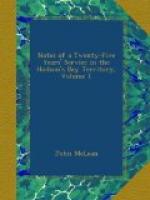A good hunter always leaves his lodge by dawn of day, and seldom tastes food till he returns late at night. Hunting beavers is a most laborious occupation, and becomes more so in proportion to the scarcity of these animals; for this reason, that when a great number of beavers occupy a lake, their places of retreat are in closer proximity to each other, and for the most part inhabited; if the number be reduced, it is likely they will have the same places of retreat, and the hunter must bore through the ice, before he can ascertain whether they are inhabited or not.
The sagacity of their dogs is truly surprising. The beaver house being first destroyed by the hunter, the dogs are urged by a peculiar call to scent out their retreats, which they never fail to do, whatever may be the thickness of the ice. They keep running about the borders of the lake, their noses close to the ground, and the moment they discover a retreat, begin to bark and jump on the ice; the hunter then cuts a hole with his trench, and with a stick which he carries along with him feels for the beaver; should he find one, he introduces his bare arm into the hole, and seizing his prey by the tail, drags it out on the ice, where it is dispatched with a spear. There is less danger in this operation than one would imagine, for the beaver allows itself to be seized without a struggle, but sometimes inflicts severe wounds on his captor after he is taken out of the water.
When the retreat is not inhabited, the entrance to it is barred by sticks, and the hunter proceeds to chisel again, and continues his operations until the beaver is either taken, or shut out from all his haunts, in which case he is compelled to return to the house to take breath, where he is either shot or caught in a trap.
The language of these Indians is a dialect of the Sauteux or Bungee, intermixed with Cree, and a few words of French derivation. The greater part of them have a smattering of French or English; but the acquisition of a foreign language is extremely difficult to them, from the peculiar formation of their own, which wants the letter r. An Algonquin pronounces the word “marrow” “manno” or “mallo.” Their dialect has all the softness of the Italian, but is extremely poor and defective.
CHAPTER XV.
EMBARK FOR THE INTERIOR—MODE OF TRAVELLING BY CANOES—LITTLE RIVER—LAKE NIPISSING—FRENCH RIVER—OLD STATION OF INDIAN ROBBERS—FORT MISSISSAGA—INDIANS—LIGHT CANOE-MEN—SAULT STE. MARIE—LAKE SUPERIOR—CANOE-MEN DESERT—RE-TAKEN—FORT WILLIAM—M. THIBAUD—LAC LA PLUIE AND RIVER—INDIANS—WHITE RIVER—NARROW ESCAPE—CONVERSATION WITH AN INDIAN ABOUT BAPTISM.
On the 25th April, 1833, I embarked on board of a steamboat at Lachine, and reached Hull on the 27th. Here the regular conveyance by land carriages and steamboat ended, and the traveller in those days was obliged to wait his passage by the canoes of shanty men, or hire a boat or canoe for himself. I had recourse to the latter expedient, and reached the post of the Chats, then in charge of my esteemed friend Mr. McD——l, on the 30th. Captain Back arrived on the 1st of May, put ashore for a few supplies and my wards, and immediately re-embarked.




